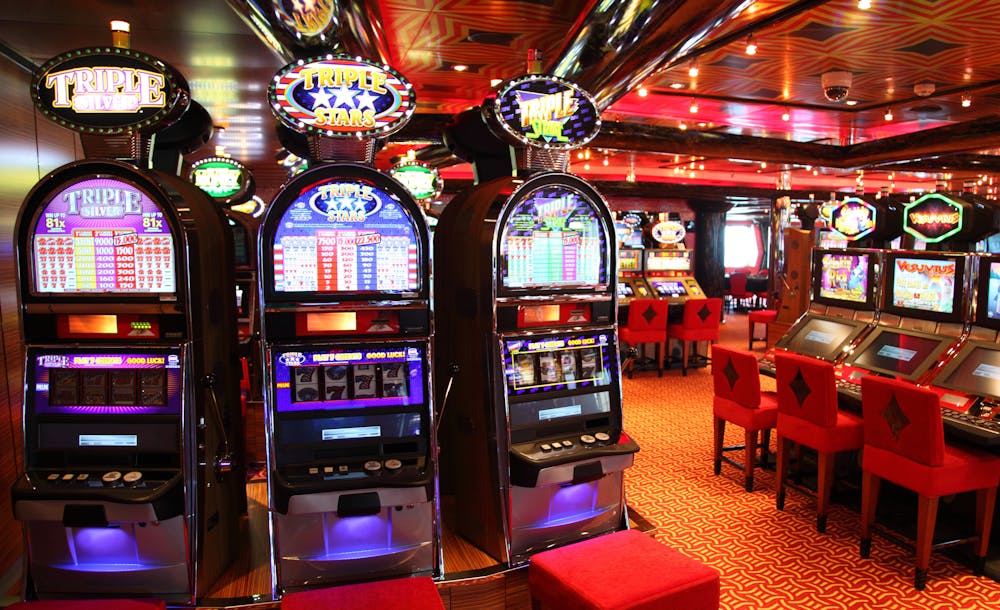- Electronic Gambling Machines
- Electronic Gambling Games
- Electronic Gambling Machines For Sale
- American Gaming & Electronics
The coronavirus has changed how land-based casinos operate in many ways. First off, gambling establishments now require players to wear a mask when they’re on the gaming floor.
Video gaming locations in Region 4 (Bond, Clinton, Madison, Monroe, Randolph, St. Clair, and Washington counties) and all licensed gambling operations at DraftKings at Casino Queen and Argosy Casino Alton are subject to Phase 4 of the Restore Illinois Plan, beginning February 05, 2021. Gambling (also known as betting) is the wagering of money or something of value (referred to as 'the stakes') on an event with an uncertain outcome, with the primary intent of winning money or material goods. Gambling thus requires three elements to be present: consideration (an amount wagered), risk (chance), and a prize. Vintage Radio Shack Electronic Casino Poker Game Card Game 60-2487. $29.95 + shipping. NEW Bee 3 in 1 Casino Handheld Game Poker Blackjack Slots Electronic Gambling. $15.00 + shipping. Radio Shack Deluxe 3-in-1 Pocket Casino. EGF provides the definitive infrastructure for interscholastic esports. With students at the center, EGF’s collegiate and high school leagues and programs are designed with inspiration from the best aspects of traditional sports to provide the platform for students to make their mark in esports.
Secondly, players must maintain proper distancing from each other. Guidelines suggest that gamblers sit with at least one slot machine or table game seat in between them.
But one of the lesser-known changes that’s taking place in casinos is the rise of electronic gaming. Electronic terminals have become much more popular in brick-and-mortar casinos ever since COVID-19 hit.

The increased popularity of real money online casinos during COVID-19 was entirely expected. After all, many gamblers feel like staying home so they have less chance to catch the virus.
However, the rising popularity of electronic games wasn’t as expected. I’ll discuss more on this phenomenon below along with reasons for why people are looking past live table games towards the machines.
More People Are Playing Electronic Table Games

Casinos provide electronic terminals as an alternative to regular table games. These games allow players to gamble in relative isolation just like with slot machines.
Electronic gaming had already earned its spot on casino floors. But more and more people are playing these machines than ever before today.
According to Vegas Inc, game developer Scientific Games has seen demand for their electronic table games triple since COVID-19 hit in March. Most of this demand is centered on dealer-assisted setups, which feature a single dealer who serves up to 250 terminals.
Station Casinos previously shunned the idea of widespread electronic gaming across its properties. The company has since changed its tune, though, with the coronavirus still persisting. They’ve now installed terminals at all of their Las Vegas properties.

Why Electronic Games Over Live Tables Games?
Under normal circumstances, many gamblers prefer live table games over the electronic versions. The primary reason why they visit land-based casinos in the first place is for a social experience.
Terminals don’t offer the same social atmosphere as tables. But during the COVID-19 era, they do a feature some very specific benefits, including those covered below.
Easier For Players to Social Distance
As mentioned before, many casinos require players to remain at least one seat apart. Even with this precautionary measure, though, gamblers may be close enough to spread the coronavirus.
Electronic terminals are even further apart. Therefore, gamblers don’t need to worry as much about catching the virus when they stay at their machine.
Of course, this doesn’t mean that one is completely COVID-proof when playing electronic games. But they can at least lower their chances of getting the virus when sticking to the machines.
Less Labor Needed
Casinos are stuck in a bad spot right now. On one front, they’re coming off of being shut down and trying to make a comeback financially.
The same process is necessary for electronic machines as well. Employees need to sanitize each game and ensure that it’s clean for the next player.
However, casinos don’t need to employ dealers to run these games. Instead, the players themselves operate the machines.
Of course, dealer-assisted electronic gaming does feature at least one croupier. But the same dealer can serve up to 250 machines at once.
Potential to Attract Millennial Gamblers
Millennials aren’t attracted to the same type of casino games as previous generations. Specifically, most millennials don’t spend much time playing slots.
However, young gamers do enjoy playing table games. They especially like skill-based games like blackjack, Caribbean stud, and three-card poker.
That said, electronic gaming already appeals to millennials due to the fact that it’s based on table games. It offers even more appeal when considering that it runs through machines.
An older gambler may be intimidated by a new type of gambling machine. Younger players, though, have spent much of a lives on devices like smartphones and tablets. They’re perfectly comfortable transitioning to new gaming terminals.
Casinos Can Be Profitable with Lower Stakes
Brick-and-mortar casinos typically feature minimum bets ranging from $10 to $25. Compare this to online casinos, which allow you to play baccarat, blackjack, and other games for just $1 per hand.
Electronic terminals alleviate these costs to some degree. Again, only one dealer is needed to run the game for an entire bank of machines.
Therefore, operators don’t have to charge as much for minimum wagers. They can require players to risk a dollar or less and still make plenty of money.
The option is always available to bet more if you feel like doing so. But the key advantage is that you don’t have to risk as much as with regular land-based tables.
Has Electronic Gaming Truly Arrived?
Electronic terminals have been around for a while. Brick-and-mortar casinos feature both dealer-assisted and solo electronic gaming such as roulette and craps.
Again, this type of gambling serves as a nice alternative to regular table games. But it’s never come close to taking over the table sector.
However, the coronavirus is making this type of gaming more popular. Gamblers are choosing machines over tables for multiple reasons:
- Easier to social distance.
- Lower minimum bets.
- Ability to gamble online when the mood strikes.
- Can be less intimidating than live tables.
I wouldn’t say that the electronic gambling era has truly arrived. Instead, it’s merely been given more rise thanks to COVID-19.
It will still remain a viable part of the casino market—perhaps even more so—once the coronavirus wanes. But it’s not going to completely replace live table games. The latter offers special aspects that can’t be mimicked by anything else in the casino.
However, electronic terminals might gain a little more space on floors following the pandemic. More people will feel comfortable playing these machines, which will, in turn, make them slightly more popular long term.
How Can You Get Started with Electronic Table Games?
After reading this, you may be considering whether electronic table games are worth your time. You might be especially interested due to the current pandemic.
If you haven’t played electric terminals in land-based casinos before, then you may appreciate some tips on doing so. Here are the steps for getting started with these games.
Step 1: Insert Your Money
You begin by inserting your cash into a machine just like with a slot machine. Each terminal has a bill acceptor that’s similar to a slot. You’ll see the credits come up on your touchscreen.
Step 2: Selection Your Chip Denomination
Each terminal and casino can differ in terms of what chip denominations they offer. Generally speaking, though, you’ll be able to use chips worth $0.25, $1, $5, $10, $25, and/or $100.
Step 3: Use the Touchscreen to Place Bets

You’ll see a digital table game setup on your touchscreen. You push the different options on this screen to place bets and decide on actions (like in blackjack).
Step 4: Confirm Your Bets
The dealer only gives you to long to make decisions—just like with live gambling tables. Therefore, you need to place bets within a reasonable amount of time. Once satisfied with your selections, select the “Bet” button to confirm everything.
Step 5: Re-bet or Start Over
The dealer will play out the round to determine results. Your bet will be paid (if successful) electronically afterward. At this point, you can either re-bet with the previous choice(s) or start over and pick a new wager.
Conclusion
Electronic gaming didn’t arrive yesterday. It’s been available in land-based casinos for quite some time. However, it has picked up steam in recent months due to the coronavirus.
Some gamblers are apprehensive to sit in close proximity to other players due to COVID. Terminals make for suitable alternatives due to their distance from each other.
If you’re worried about catching the virus in land-based casinos, then you might consider electronic gaming. It may not be exactly like live table games, but it still provides an opportunity to enjoy exciting gambling action.
Electronic games bring new ideas to the table, along with bonuses that appeal to all players
By John Grochowski
Electronic Gambling Machines
While there will always be players who want to interact with live dealers and have a stack of chips to riffle, instead of an electronic betting screen to touch, games with electronic components do bring exciting possibilities.
There is a school of thought that says you’re either a table games player, or a slot player. Sure, a lot of players enjoy crossing over now and then; there will always be craps players who take an occasional spin on the slots, and video poker players who enjoy trying their hand at blackjack. But we tend to define ourselves, as gamblers, in terms of one of those two categories.
This distinction, though, has become blurred with the rise of electronic table games. Spurred by the success of Shuffle Master’s Rapid Roulette, these machines have started to enter the casino mainstream. And while there will always be players who want to interact with live dealers and have a stack of chips to riffle, instead of an electronic betting screen to touch, games with electronic components do bring exciting possibilities.
The games don’t have to be entirely electronic; Shuffle Master’s iTable uses live dealers and physical cards. What matters most are the bonus possibilities these high-tech games are able to offer, creating an experience that one table games director called “a home run out of the park.”
The initial release of iTable gives blackjack players the option to make the same side bets that are available on Shuffle Master’s live tables (including Royal Match). Used in combination with a Shuffle Master card-reading shoe, it also can put up odds for side bets after you’ve seen your cards. For example, if you have a 17 against a dealer’s 9, or a 16 against a 7, it can offer you odds on winning the hand.
Slot manufacturing giant IGT (International Game Technology) has also started down this road with its Table iD system. Instead of using a video betting screen, it uses RFID chips—chips embedded with radio frequency identification chips—to improve accuracy in player tracking. The first bonusing application was Lucky Draw, which allows players to earn “tickets” to a virtual drawing as they play.
Extra blackjack bonuses—such as giving players who are using their rewards cards an entry for each two-card 21—can be done in a virtual way, without players needing to fill in names and addresses on paper tickets. Operators can use their imaginations to create drawing games. An IGT representative suggested a Fourth of July promotion could be “Fours on the Fourth,” with a virtual ticket for each pair of 4s. Or there could be a “Win for Losing” promotion, with players earning a ticket every time the dealer receives a blackjack.
If more players begin to embrace table games with electronic components, the sky’s the limit for bonusing possibilities. Beyond that, there are plenty of reasons for casino operators to utilize electronic or partially electronic tables. They include:
** The games are faster, with more action. Less time spent dealing cards or making payoffs means more hands will be played per hour.
** Reduced labor costs. Live tables requires not only a dealer at each game, but pit supervisors to oversee everything. Electronic games reduce or eliminate these costs. This allows casinos to offer electronic versions of table games with lower minimum bets than on live tables. A blackjack newbie might be able to get their wet at $1 or $2 a hand, even in a casino where their live tables have $10 minimums.
Electronic Gambling Games
**Electronic payoffs eliminate dealer mistakes and the possibility of dealer-player collusion.
** Electronic wagering allows the casino to track every wager by a customer using a players club card, just as is done on slot machines. This leads to more accurate player rewards.
The big question remains player acceptance, and in the coming years you can expect to see some experimentation as casino execs figure out what’s working. In the meantime, here are a few games to keep your eye out for, and the features that make them special:
Rapid Table Games, by Shuffle Master: With Rapid Roulette as a starting point, Shuffle Master has expanded into Rapid Baccarat, Craps and Sic Bo. In the breakthrough game Rapid Roulette, each player has a screen on which to place bets. There remains a live dealer and a physical wheel, but the responsibility for tracking bets and accounting for chips is removed from the dealer. Cheating scams such as past posting (sneaking a bet onto the layout after the ball has fallen into a numbered slot) are eliminated. The dealer spins the wheel and interacts with the players, but the system tracks the bets.
Players who like to play—or avoid—the most recent numbers, or those that have hit frequently in recent spins, will have a blast with Rapid Roulette. Plasma screens track the numbers and give percentages. How often has No. 18 hit? What percentage of spins have been red? Even? Etc. It takes the roulette traditions of posting recent numbers on a lighted board, or allowing players to track numbers with pencil and paper, to the nth degree.
Table Master, by Shuffle Master: Unlike its cousin, the iTable, Table Master is fully automated. Games use a five-seat console; a touch-screen playing surface; and a curved center screen standing upright behind the table with a video representation of a dealer. The dealer interacts with the players, says hello, and makes comments; the eyes even follow the players as they sit down and make their bets. Making things even more realistic, there are a number of video dealers with different personalities and they change periodically, just as live dealers change tables and take breaks.
In some jurisdictions, fully automated games such as Table Master are licensed as slot machines, meaning casinos that are not approved for table play can offer them. Blackjack and baccarat are available on Table Master, as are Shuffle Master games including Let It Ride, Three Card Poker, Three Card Bonus and Ultimate Texas Hold’em.
Digital 21, Blackjack Dice, Baccarito, World Poker Tour All-In Hold’em, Dragon Bacc, Texas Hold’em Xtreme, Tarracab and more, by DigiDeal. DigiDeal has been the American pioneer in electronic table games for years, and figures to get an even higher profile under a new alliance with IGT.
The initial version of Digital 21 uses a live “host” and chips—it’s the cards that are dealt digitally—but the next generation game, on what DigiDeal calls its DTS-X platform, uses virtual chips. Played on a traditional horseshoe-shaped blackjack table, Digital 21 has a screen at each player position to display cards. The casino employee at the table is a host, rather than a dealer. He or she deals no cards, but makes payoffs and interacts with players.
PokerPro, by PokerTek: One of the big success stories in electronic gaming, PokerPro has been carving out its niche with fully automated electronic poker tables. Tables can be configured for Limit, No Limit, Pot Limit Texas Hold’em and Omaha cash games, or single and multi-table tournaments. They use neither chips nor cards. Each player has a screen in front of their seat, and there’s a larger screen at the center of the table to show common cards, such as the flop, turn and river in Hold’em.

Electronic Gambling Machines For Sale
When players receive their cards, they are face down, just as in live poker games. To see what they have, players touch the representations of the cards, and just the corners turn up. By cupping their other arm in front of the cards and peeking at the corners, players can keep their hands just as secure as at a live table.
PokerPro Heads-Up, meanwhile, is a two-seated poker table offering the game variations, but allows players to compete head to head. These showdowns are something you never see in traditional poker rooms, since it would be too costly for operators to staff two-player tables.
Is PokerPro going to replace live tables overnight? Of course not, nor are Shuffle Master or DigiDeal products going to replace live blackjack. There’s no question, however, that these machines brings a lot to the table and are carving their own niche in casinos—with many more types of electronic games, and exciting features, to come.